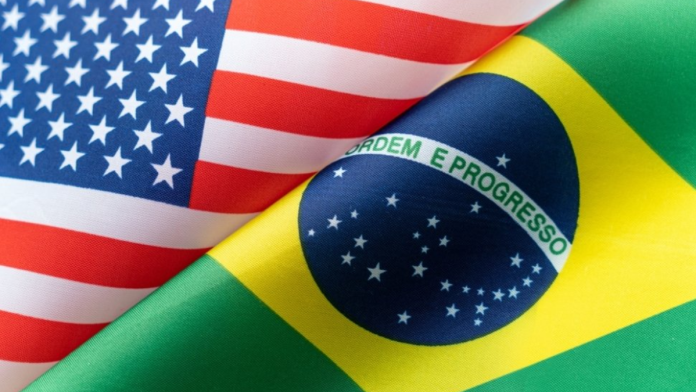Tensions between the United States and Brazil have reached a new high after President Donald Trump signed an executive order placing major tariffs on Brazilian imports and sanctions on a top Brazilian judge. The unexpected double blow comes as a reaction to what the US government calls unfair trade practices and judicial overreach in the case against former Brazilian president Jair Bolsonaro.
The measures have shocked officials in Brasília and added stress to an already complicated diplomatic relationship.
Sharp US Tariffs on Brazilian Imports Spark Major Trade Tension
The US government has announced a steep 50% tariff on goods imported from Brazil. This includes a fresh 40% duty added to the standard 10% already in place. The new tariff, scheduled to take effect in seven days, will target key exports such as coffee and meat. Essential imports like orange juice, aircraft, and iron ore have been temporarily exempted.
President Trump had earlier demanded an end to Bolsonaro’s ongoing trial, calling it a political attack and warning of trade consequences. With the tariffs now official, the White House said Brazil’s actions “pose an unusual and extraordinary threat” to US economic and foreign interests.
💣 $87 billion in danger — Trump’s 25% tariff plus penalty sends shockwaves through Indian businesses
Alberto Ramos, a top economist at Goldman Sachs, estimates the tariff could shave 0.25% off the country’s gross domestic product. In response, Brazil’s government is preparing a financial support package for affected companies, though no details have been released yet.
The move marks a sharp turn in trade relations between two of the largest economies in the Americas.
US Slaps Sanctions on Brazilian Supreme Court Judge
At the same time, the US Treasury’s Office of Foreign Assets Control has added Brazilian Supreme Court Justice Alexandre de Moraes to its sanctions list under the Magnitsky Act. The judge is currently overseeing the high-profile trial of Jair Bolsonaro, who is accused of plotting to stay in power with military help after losing the 2022 election.
The sanctions freeze any US-based assets de Moraes may own and bar US individuals and businesses from engaging with him. Secretary of State Marco Rubio said the judge was being penalized for “serious human rights abuses,” including unfair detention practices and restrictions on free speech.
📢 Trump weaponizes AI to crush reliance on India, China — ‘Put America first or pay’
Earlier this month, the US also issued a visa ban on de Moraes and seven other justices involved in cases related to Bolsonaro and US tech companies operating in Brazil.
These sanctions are rare in cases involving democratically elected governments and underscore the seriousness with which the US is treating the issue.
Brazil Pushes Back But Avoids Retaliation — For Now
Brazilian President Luiz Inácio Lula da Silva issued a strong response, calling the US sanctions an unacceptable interference in Brazil’s judicial system. He expressed support for Justice de Moraes but did not announce any retaliatory measures.
👉 One deal, 15% tariff, and a trade war averted — inside the EU–US pact
In his statement, Lula said that Brazil remains open to trade talks but will not surrender its legal sovereignty. The government is currently reviewing options to support industries hurt by the new tariffs.
Meanwhile, Jair Bolsonaro, who is at the center of the legal storm, remains under court-ordered restrictions. The Supreme Court ordered him to wear an ankle monitor, observe a curfew, and avoid media interviews. He has requested permission to travel to the US to help mediate the situation but has not received approval, as his passport remains confiscated.
His son, Eduardo Bolsonaro, who moved to the US earlier this year to lobby the Trump administration, celebrated the sanctions and tariffs. He posted “Mission accomplished” on Instagram shortly after the measures were announced.
The verdict in Bolsonaro’s case is expected within weeks and could carry decades-long prison consequences if he is found guilty of attempting to undermine Brazil’s democracy.


